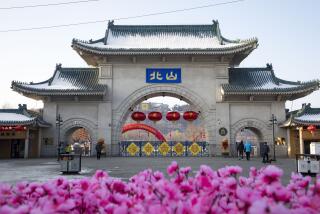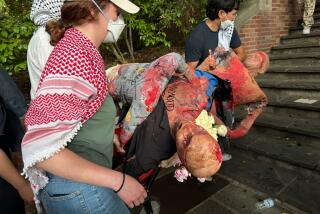Chinese March in 4th Day of Anti-African Protests
- Share via
BEIJING — A bitter standoff continued Tuesday in Nanjing as anti-African disturbances erupted for the fourth day and about 140 foreign university students, mostly Africans, were held in protective isolation at a suburban guest house.
Nearly 1,000 Chinese students staged another anti-African protest march through the East China city Tuesday while larger crowds simply milled in the streets, according to American students who spoke by telephone with reporters in Beijing.
Many of the demonstrators said they want revenge, said one of the American students, who spoke on condition he not be identified, “and they want people (African students) to be held responsible for what they did.”
The trouble began Saturday evening with a clash between African students and university gatekeepers at Hehai University. It escalated into rock-throwing attacks by Chinese students Saturday and Sunday on dormitories housing Africans. This was followed by street demonstrations by youths incensed by an apparently false rumor that a Chinese man died in the initial clash.
The official New China News Agency said 11 Chinese and two Africans were injured in Saturday’s violence. Chinese authorities continued to say Tuesday that no one had died.
Truckloads of police cruised the city Tuesday evening in a show of force aimed at restoring order, American students said. For part of the evening, about 200 police officers stood guard outside the Jinling Hotel, a leading tourist establishment, according to David Chen, a student from Duke University in Durham, N.C.
African diplomats flew into Nanjing on Tuesday to meet with the African students. The students, according to Americans who spent time with them, began seeking refuge at Nanjing’s train station Sunday, hoping to travel to the safety of Beijing, 600 miles to the north. Their numbers grew Monday as Chinese protesters chanted, “Down with the black devils!” Americans said.
But police prevented the students from boarding crowded trains to Beijing on Sunday and Monday, even as thousands of angry Chinese demonstrated outside, the American students said.
Late Monday evening, police forcibly removed more than 100 Africans--plus students from Pakistan, Bangladesh and Nepal, several Japanese, about eight Europeans and six Americans--from the train station and put them on five buses, according to Elizabeth Morrison, 20, a junior at Amherst College in Massachusetts now studying at Nanjing University. Morrison said she was one of the six Americans.
“People were kicking and screaming and saying, ‘I’m not going,’ ” said Elizabeth Chace, a student from Wesleyan University in Middletown, Conn., who also was in the group. Others, however, realized that they were badly outnumbered by the angry mob outside and did not resist boarding, she said.
The American, European and Japanese students--who are all light-skinned and therefore not targets of the mob violence--had gone to the station to bring food and drink to the dark-skinned students, who gathered in the first-class waiting room, Chace and Morrison said.
The buses, accompanied by police vehicles, were driven to a factory guest house about two hours outside Nanjing, where the students were held overnight without access to telephones, Morrison said.
Morrison said she and four other Americans left the guest house by car at 7:30 p.m. Tuesday. They were the first group to leave, she said.
Met With Diplomats
By the time she left, Morrison said, the African and Asian students, numbering about 130, had met with diplomats from nine African countries but still appeared unanimous in demanding that arrangements be made for them to travel to Beijing.
Although Chinese foreign policy stresses solidarity with Third World countries, there is widespread prejudice among ordinary Chinese against people with dark skins, especially Africans.
Most African students in China are men who come first to study Chinese and then to learn technical skills, requiring stays that typically run about six years. These men want to have a social life in China, but many Chinese react very negatively when they see African men with Chinese women.
During the anti-African protests Monday, there also was some general criticism of favoritism to foreigners, who normally receive access to superior food and housing.
Dispute at a Dance
The Saturday night clash began when African students attempted to take two Chinese women through the gate of Hehai University to attend a dance organized by foreign students, according to American students and the New China News Agency. An argument ensued when proper identification was not produced for the women, these sources agree.
Many universities require visitors to register at the gate, but these rules often are not enforced. The rules are sometimes used to limit contact between foreigners and Chinese.
“The idea was to keep the Chinese girls out--that’s kind of a sore subject between the races here,” an American student said.
More to Read
Sign up for Essential California
The most important California stories and recommendations in your inbox every morning.
You may occasionally receive promotional content from the Los Angeles Times.













